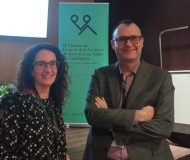

The Research Institute of the Hospital de la Santa Creu i Sant Pau – IIB Sant Pau participated, together with twenty research centers in Catalonia, in the II Gender Summit of the Health Research Centers of Catalonia, which promotes work in favor of progress towards more responsible health research.
The conference, chaired by the Minister of Health, Manel Balcells, and the Minister of Research and Universities, Joaquim Nadal, has been organized by the Health Quality and Assessment Agency of Catalonia (AQuAS) and the General Sub-Directorate of Research and Innovation of the Department of Health, in coordination with the Department of Research and Universities and iCERCA, and with the collaboration of the “la Caixa” Foundation. The event was attended by Maria Rosa Ballester, head of Research and Innovation in charge of IR Sant Pau and member of the organizing committee of this summit, and the director of IR Sant Pau, Dr. Jordi Surrallés.
The success of the second edition of the Summit is a firm step in the commitment signed by the health research centers in 2019, in order to contribute to the progression of women’s scientific careers, in the ‘elimination of barriers and implicit biases that affect health research.
In addition, with the aim of improving the quality of the knowledge produced for the benefit of the entire population, the commitment signed commits to incorporating the gender perspective in research and innovation. And although the gender gap still exists, the efforts of the centers have resulted in a slight improvement in the situation of inequality in teams and leadership.
During the course of the day, it was made clear that the future Catalonia’s Science Law, currently in the final stages of processing in Parliament, will establish a specific Catalan scientific policy defined, among other features, by the transversal incorporation of the gender perspective. The rule will promote the adoption of measures against gender bias and any other form of discrimination, and among its main objectives will set the promotion of parity between women and men in all areas of the knowledge system.
This law is also expected to integrate as organizing principles key points in gender matters such as the equality of women and men in the scientific career or the inclusion of the gender perspective in all phases of research, development and innovation .
Likewise, it foresees that public agents of research, development and innovation are equipped with a gender equality plan. This plan will need to incorporate measures to move towards gender equality, at the same time as including gender expert personnel in the evaluation and advisory bodies and ensure the balanced composition of the governing bodies. It will also be necessary to determine the evaluation tools for compliance with the plans, which will have to provide for the corresponding corrective measures.
The agents of the research, development and innovation system of the public sector must also include in the ethical codes the obligation to act in the event of sexual harassment and gender-based violence. In the same way, they will need to establish protection and support mechanisms for victims.
The first edition of the Gender Summit took place in 2019 in Girona. Driven by the same objective, it hosted the creation of the Hypatia Practice Community and the signature, by the directors of the attending centers, of the Hypatia Charter of Alexandria. Among them, he signed IR Sant Pau. This agreement contained the twelve main points on which they focused their itinerary to reverse the situation of gender inequality shown by the nominal data.
This law integrates in its articles, therefore, the spirit of the commitments gathered from the Charter of Hypatia, focused on advancing towards gender equality in research and contributing to diversity in the world of science. The document focuses on specific aspects such as wage inequality, the elimination of obstacles that pose a problem for accessing a stable professional career after the doctorate, the improvement of employment contracts or the promotion of changes in organizational culture and the ‘professional structure.
Along these lines, the Hypatia Community, formed by the research centers in which AQuAS participates, has worked on various aspects to advance the Hypatia commitments. Recently, he has created and published the Tool to integrate the perspective of gender and sex, with the aim of guiding researchers when considering the incorporation of sex and/or gender in studies of basic science, clinical , health services and public health. The Tool contains a list of questions and sub-questions that address the integration of sex and gender in research, with specific aspects and examples of how to incorporate them in research.
The Community of Practice is also involved in the creation of an inclusive language guide for the world of research and in the Train the trainers program. This program is focused on training volunteer facilitators in unconscious bias so that they can provide training to people in their own institution.
In the area of research, the CERCA Institution, for its part, has since 2013 had a gender commission with representation from research centers, where initiatives in the field are coordinated and cases are exchanged ‘success. The activity has fundamentally focused on raising awareness and incorporating policies with a gender perspective in order to facilitate the incorporation of female researchers, especially in managerial positions. For its part, the Women and Science Commission of the CIC, in operation since 2006, has as its mission the development of women’s policies in the field of higher education and research.